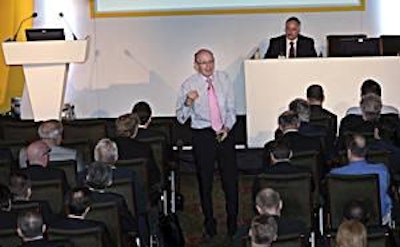
Egg industry leaders met across the world met in London in April for the first of this year’s International Egg Commission conferences. The resounding message of this conference was the importance of corporate social responsibility. Delegates discussed at length ways in which the egg industry can help to protect the environment, while producing sufficient food to feed the world’s growing population, and continuing to provide the best care for laying hens.
CSR is critical
CSR is now a critical element for all successful organisations; this was the message from Professor David Hughes, a professor of Food Marketing at Imperial College London.
Professor Hughes told the IEC that CSR is now consistently listed in the top three concerns of global retailers, as reported by the Consumer Goods Forum. Retail giants, including Wal-Mart and Tesco, have already set their own CSR targets and sustainable agriculture goals, and they expect their suppliers to comply with these. Tesco has already asked its suppliers to reduce the carbon footprint of their products.
Professor Hughes explained: “Suppliers that don’t sign up to the sustainability agenda face the risk of de-listing”.
Producers and suppliers are now under intense pressure from both retailers and consumers. Steve Murrells also addressed the IEC delegates; he is a former senior executive of Tesco, and is now CEO of Tulip, the largest supplier of pork and bacon to the UK retailers. Having a wealth of experience from both sides, first as the retailer, and more recently as the supplier, Murrells stressed to the audience the importance of understanding and responding to the retailers’ needs. He urged egg producers to supply solutions to retailers and to be at the forefront of new innovations and new ideas.
Like Hughes, Murrells recognises that CSR is huge for retailers, and believes that it should now form an integral part of all successful suppliers’ business plans: “One of the most important levers which is just starting to emerge, is the environment and community; community in terms of giving something back to the neighbourhood and environment in terms of being green”.
Great potential for the egg industry
Professor Windhorst, IEC Statistical Analyst estimates that by 2015, egg production will need to be as high as 70.9 million metric tons to meet global demand. Eggs are the highest quality, most cost effective source of animal protein, essential in feeding a growing worldwide population. The recurring question throughout the international egg industry is how to increase egg production sufficiently to feed the world’s growing population while also complying with increased regulations.
Eggs already play an important role in feeding the world’s current population, and as the global population grows to a staggering 9 billion people, eggs will become even more important in the battle to produce sufficient sustainable food. During the IEC conference, Nan-Dirk Mulder discussed the competition for land use between the different production alternatives, and also stressed the important role that eggs can play in feeding the world. In addition, he stressed to his audience the importance of CSR: “The key issue if you look ahead is definitely CSR”. He believes that the growing demand for food and fuel, combined with the limited resources, means that producers will be asked even more questions from their clients and will be called on to justify how conscientiously they are using the world’s resources. Mulder predicts great potential for the egg industry due to its efficiency and flexibility.
Could the solution be round?
During the three-day conference, IEC delegates learned more about the many challenges facing their industry: the demands from retailers and consumers to be more environmentally conscientious; the need to produce more eggs to feed the growing population; the increasing pressure from animal welfare groups; and the new regulations in the EU and parts of the US banning conventional cages.
There is no doubt that meeting all of these demands from the many stakeholders is a difficult challenge, but the egg industry is incredibly well placed to succeed.
Ruud Zanders, from The Netherlands, addressed the conference and presented an innovative new hen housing concept, the Rondeel. the Rondeel is a completely new housing system that was designed in The Netherlands after lengthy consultations will all stakeholders, including the public, farmers, animal welfare groups, retailers and legislators, and is the only non-organic product to be awarded a three star status, for animal welfare.
Future opportunities
Despite the many challenges that face the industry, those within it are confident that the egg industry’s future is excellent. Chad Gregory, from the United States' United Egg Producers, closed the London conference telling delegates: “The egg industry’s future is incredible; the opportunities are incredible. We have a very affordable, high-quality protein source that’s probably the most efficient of anything in animal agriculture for taking inputs and turning them into a high quality protein; our environmental carbon footprint is the best of anyone. There are so many positives that our industry has to tell, and so many incredible opportunities. We can help to feed the world’s growing population. Eggs are a fantastic product.”
The next IEC conference is being held in Washington D.C., 18 – 22 September 2011.


















